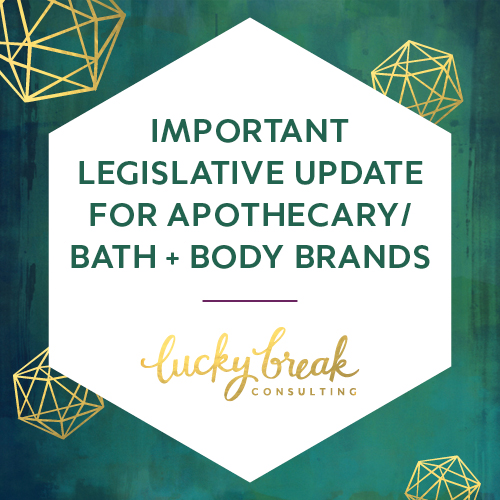While whispers of new federal cosmetic legislation coming down the pike are nothing new, those whispers grew a bit louder last week. Reignited by a new discussion draft bill in the House of Representatives, the whispers have now become rumbles and astute makers in the personal care space (soaps, spa products, bath products, minerals makeup, hair care preparations, nail polish, and the like) are wise to take notice. I encourage you to pour a cup of coffee and spend a few minutes with this important update!

By way of background…
Special interest groups have had the ear of legislators for some time now, pressuring Congress to require the FDA to grant new mechanisms of oversight and increased powers in their governance of personal care products sold within the United States. Separate lobbying groups representing the interest of multinational conglomerates, mid-size manufacturers, and artisan makers have met many times with Congressional officials and staffers to help them better understand the industry and work to find “win-win” solutions that serve the public interest without causing unnecessary negative impacts on the businesses who count on this industry to pay the mortgage and feed their families.
From 2008-2010, I participated in lobbying efforts with a small team of dedicated, passionate women who sought to work with select Congressional staffers to build an understanding of how artisan apothecary makers create products and manage home workshop and small businesses. Though I remain immensely proud of that work, I long ago stepped out of active lobbying, moving to the sidelines while keeping a careful eye on unfolding events. After watching a small wave of previously-introduced bills die in committee without much attention, my ears perked up last week as the movement once again gained steam.
A NEW HOUSE BILL AIMED AT COSMETIC LEGISLATION
On September 14, Congressmen Pallone (D-NJ) and Lance (R-NJ) introduced a new discussion draft on the House side aimed at overhauling federal cosmetic legislation. It’s worth noting that this discussion draft will undertake quite a lengthy journey on its path the becoming a law. However, discussion drafts are circulated in an effort to collect feedback and it’s much easier to influence the process early as opposed to rushing in at the eleventh hour, which means that voices raised now will have a larger impact on shaping the legislation than those raised later.
It’s particularly notable that the proposed bill has early bipartisan support. Also notable? It’s very similar to a Senate bill introduced earlier this year by Diane Feinstein (D-CA) and Susan Collins (R-ME). Quick political refresher: the House passes its own bills, as does the Senate. Those bills must be reconciled before a final vote by the whole of Congress on a single bills. Bills which are approved by Congress then become law unless vetoes by the president. My antenna inches ever- higher when I hear “bipartisan support” and “similar bills in both the House and Senate.” May I humbly suggest that your antenna inch ever-higher as well?
Back to that new Pallone/Lance discussion draft: while I’m grateful that small business is being considered by legislators, I’m confident that this bill doesn’t extend sufficient protections to micro manufacturers. Regrettably, passage in its current form would cause unnecessary harm to tens of thousands of small businesses across the country without delivering commensurate protection of public health.
SMALL BUSINESS CONCERNS
I have many concerns about the draft bill, and while the following list isn’t inclusive, it is an apt snapshot of several of my most pressing concerns.
1. NEW REGISTRATION FEES FOR COSMETIC MANUFACTURERS.
As outlined in the Pallone/Lance discussion draft: If your businesses *grosses* under $100k a year, then you’re exempted from all provisions of the bill, including registration fees. That’s a lovely start but $100,000 boils down to just $10,000-20,000 in profit at the end of the year and we’re going to need exemption thresholds much higher than that if small business are to thrive in this country. For reference, the Food Modernization Act set the threshold at $1million and that’s the same threshold for Prop 65 in California. This proposed exemption threshold is inconsistent and unnecessarily burdensome.
If your business grosses more than $100,000 but less than $500,000 per year, then you must adhere to all the rules but you’ll be exempted from the registration fee.
If you gross between $500,000-2.5million, you’ll be required to adhere to the rules and pay a $250 registration fee annually.
If you gross over $2.5mill a year, then you’ll need to adhere to the rules and pay a higher fee on a sliding scale according to revenue.
IMPORTANT NOTE: My primary concerns about this proposed bill revolve around the regulatory and paperwork burden this will cause. While the fees are an inconvenience and somewhat burdensome, they pale in comparison to the damage that will be done by other facets of the new regulations.
The additional paperwork burden is especially problematic and it has the potential to cripple small businesses. If the bill were to pass as it’s currently written, all business grossing over $100,000 would be legally required to adhere to all new regulations, including those I’ll detail below. And lest you forget, most handmade businesses net 10-20% profit, so while that $100,000 gross sales figure may feel expansive, it’s actually quite meager. If that doesn’t feel like a problem for you, then I encourage you to aim higher for your business. 😉
2. PERSONAL CARE MANUFACTURERS WILL NEED TO FILE COSMETIC INGREDIENT STATEMENTS FOR EACH OF THEIR FORMULAS DIRECTLY WITH THE FDA.
No pre-approval of finished product is necessary, but everything will need to be on file, including the exact percentages of all ingredients within a given formula. If the formula changes in any way, a new recording must be placed in the FDA files. Note that there is a statement in the discussion draft that the FDA “may” allow for altered rules for small business. That language isn’t strong enough as it stands and it guarantees small businesses no specific protection.
3. IF THIS BILL WERE TO PASS WITH AN OPEN WINDOW FOR THE FDA TO LATER CRAFT SPECIAL RULES FOR SMALL BUSINESS, THEN WE’LL ALL BE IN LIMBO FOR SEVERAL YEARS AS THE RULEMAKING PROCESS UNFOLDS.
Any period of legislative uncertainty is less than ideal. Long periods of legislative uncertainty are far less than ideal from a business perspective. Mergers and acquisitions necessarily slow, lenders are reticent to extend credit, and manufacturers are hesitant to make investments in their business without the some assurance of what the future holds. Most of the apothecary brands I work with can’t afford a 2-5 year “pause” in their business.
4. MANUFACTURERS WOULD NOW HAVE THE BURDEN OF CERTIFYING THAT THEIR PRODUCTS ARE SAFE IN THEIR FINAL FORM.
There’s a lot of language in the discussion draft of how that might be done, but none of the avenues are especially viable for small businesses. I’m not sure that any business with $1million annual gross could comply. I’m fairly certain that businesses on $100,000 annual revenue would be unable to comply.
5. REMOVAL OF EXISTING TRADE SECRET PROTECTIONS.
Manufacturers may still use the “trade secret” designation for ingredients like “fragrance” on the ingredient listing on a product label. However, manufacturers will be required to list their supplier, the specific item number of the product, and the percentage on the ingredient declaration to the FDA (see item #2 above). That methodology virtually removes trade secret protections that have been in place for decades.
6. REQUIRED REGISTRATION OF COSMETIC MANUFACTURING FACILITIES.
All manufacturing facilities must be registered with the FDA, so registration of home workshops will no longer be voluntary.
MAKING YOUR VOICE HEARD
What can you do to help shepherd this process and protect your business? I’m so glad you asked! There is strength in numbers and each of us has an obligation to speak up for ourselves and our community. Please don’t count on others to carry the banner for you… this is the time for you to become active and engaged!
The Senate is hosting its first cosmetic legislation hearing this on Thursday, September 22 at 10am EST. You can watch the public hearing as it streams live. Invited guests include Senators Feinstein and Collins, the chief scientist at the Personal Care Products Council (a trade organization representing the largest businesses in the industry), a medical doctor specializing in dermatology, a senior representative from Environmental Working Group (an nonprofit who has championed the call for additional legislation), and a “small business” representative from Jack Black, a personal care manufacturer with at least $5million in annual sales.
Read the House discussion draft for yourself. Summaries from third parties are helpful, but they’re no substitute for a through self-reading! Review the discussion draft… this section-by-section summary might also prove helpful.
Join the Coalition of Handcrafted Entrepreneurs (COHE) to connect directly with Anne-Marie Faiola of Brambleberry, a small businesswoman who has been a fierce defender of micromanufacturers since 2008. She remains engaged in active lobbying and meets regularly with Congressional officials. Anne Marie offers a direct line to the latest news about what’s happening on Capitol Hill and she needs to connect with as many small businesses as possible.
Write your Congressional officials… it only takes a few minutes! You can quickly locate your Senators and discover how to contact your Congresspeople with a few simple clicks. COHE has created a simple outline for effectively and easily contacting legislators.Tell them who you are and what how a few of the specific provisions in this bill will impact your business.
We have an opportunity to influence this process and both Congressman Pallone’s and Congressman Lance’s offices have released the draft to solicit opinions. Please make yours heard!





Lela, thanks for sharing this. My business isn’t a handcrafted business but is definitely small and will be impacted by this legislation. So I don’t know if I am amble to join COHE??? If not, is there another group I can join? I can definitely write my Congressional representatives. It’s Bethany, Lela 🙂
Bethany, Thank you for reading this so closely. You can definitely join COHE – please do. Updates are sent out quarterly and action alerts are sent out when needed for letters. As of this moment, yes, write those letters! Lela, thank you for this blog post. It’s eloquently stated and well researched.
Thank you for bringing this to our attention!
I am so grateful to you and others for the word you had done on our behalf to keep us in the loop. It is very time consuming to work as a maker and small business builder, so most of us can only dream of having the knowledge you are sharing concerning this new legislation. Thank you.
Thanks so much Lela for helping us walk through all of this. So thankful to have you, Anne-Marie and a hosts of others who are fighting for us true small business hand crafted entrepreneurs. Future changes are bound to happen but we have a voice and hopefully we (collectively) can make a difference that is best for all.
Thank you so much for sharing this. I’d been following the Senate discussions, but this proposal seems more comprehensive and unnecessarily burdensome for small apothecary businesses like my own. I’ll be writing to my representatives and will share this post on handmade forums I’m a part of.
I find it amazing that every time an artisan industry becomes vogue, government needs to step it to appease Corporations that are paranoid they will loose profits to the mom n pops.
Thanks for keeping a watchful eye out and for informing us of this important legislative attempt.